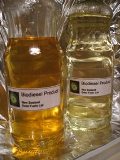Liquid biofuels

Liquid biofuels are fuels that can be produced from or are made up of a renewable material of plant or animal origin. Biofuels used in transport are typically bioethanol, , which is used as a petrol substitute, biodiesel, which is used as a diesel substitute or bio oils, which can be used to replace diesel or bunker oil in marine-type engines or industrial scale boilers. Biodiesel can also be used in residential and industrial space heating.
New Zealand has a fledgling liquid biofuels industry with considerable potential. Bioethanol is currently produced from whey, a dairy industry by-product and biodiesel from tallow, a meat processing by-product or used cooking oil. Some blended bioethanol petrol is also produced for retail sales.
There is significant potential for New Zealand to position itself as a leading producer and user of sustainably produced liquid biofuels. Transport biofuels and co-products derived from grasses, wood, and algae have the potential to displace a significant proportion of our fossil-based fuels and chemicals.
Production of biofuels usually produces co-products. These are biochemicals used to produce products like bioplastics, sugars and resins, which can have significant value, often greater than the value of the energy produced.
More information about liquid biofuels and co-products is available here.
